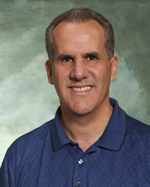Advancing the State of Methodological Knowledge
Posted on by
By thinking small, Dr. Nathaniel Schenker hopes that he and his associates will make a big contribution in the fight against cancer.
Dr. Schenker is director of the Office of Research and Methodology (ORM), which serves as the central methodological research, development, and consulting unit for the National Center for Health Statistics (NCHS). ORM provides needed technical expertise to NCHS programs while avoiding duplication of effort across the center. It conducts research on, and evaluation of, methods for use in NCHS and the broader scientific community.
His program includes three units dedicated to fulfilling ORM’s mission: the Questionnaire Design Research Laboratory (QDRL), the Statistical Research and Survey Design Staff (SRSDS), and the Research Data Center (RDC). The three groups conduct research and collaborate on projects within NCHS, the Centers for Disease Control and Prevention (CDC), and the Department of Health and Human Services (HHS), as well as other federal agencies, state and local governments, universities, private research organizations, and international health agencies.
QDRL focuses on improving the reliability and validity of survey instruments, and providing understanding of the substantive meaning of estimates. Chief among its functions is to conduct cognitive interviewing and other evaluations for NCHS and external stakeholders. SRSDS conducts research on statistical methods for design, analysis, and evaluation. It assists and collaborates on statistical issues and substantive studies within and outside of NCHS. RDC provides access to restricted-use data files to approved researchers—epidemiologists, economists, demographers, and health scientists—in a secure environment. RDC also provides technical assistance to users of the data.
One of ORM’s major areas of research is “small-area estimation” (SAE), which uses models and auxiliary predictors to enhance estimates for geographical areas or demographic subgroups for which the sample is insufficient to yield direct estimates with adequate precision and reliability. A joint project with the National Cancer Institute, the National Center for Chronic Disease Prevention and Health Promotion, and others has developed and applied methodology to combine information from CDC’s Behavioral Risk Factor Surveillance System and NCHS’s National Health Interview Survey to provide estimates of the prevalence of cancer risk factors and screening for areas as small as counties; see Small Area Estimates for States, Counties, & Health Service Areas. In another project, endorsed by the office of the HHS Assistant Secretary for Planning and Evaluation (ASPE), ORM is developing screening methods to quickly identify outcomes with sufficient small-area variability to make SAE worthwhile. Several other SAE projects are under way as well.
SAE is just one of many areas in which ORM works. For example, QDRL is completing cognitive interview research on the HHS Blood Donor Questionnaire to inform the deferral policy for men who have sex with men, and is getting ready to embark on cognitive interviewing in support of improving verbal autopsies in Kenya. The SRSDS is collaborating on the design of a new National Hospital Care Survey that combines the National Hospital Discharge Survey with the National Hospital Ambulatory Medical Care Survey; the redesign of the National Health Interview Survey; and research on ways to improve NCHS’s data linkage program. RDC is expanding its data hosting to include CDC’s National Program of Cancer Registries data, the Agency for Healthcare Research and Quality’s Medical Expenditure Panel Survey data, and ASPE’s National Evaluation of Welfare-to-Work Strategies data.
Looking ahead, Dr. Schenker has many goals for ORM. For example, he aims for ORM to develop a strategy for training staff, as needed, on topics such as sample design and cognitive aspects of survey methodology that are not traditionally taught in many academic programs. He would like to increase the number of data systems available through RDC, ideally becoming the main source for HHS data. He would also like to expand RDC’s remote access offerings, enhancing functionality and offering more choices of statistical software.
Dr. Schenker notes that ORM faces challenges. The current unstable budget environment presents a challenge to planning, and competing for talented staff with other federal agencies and contracting organizations is a challenge to project execution. He notes, though, that budgeting and staffing are challenges familiar to every organization.
While he pursues his goals and addresses his challenges, Dr. Schenker and his team continue to focus on ORM’s central mission: to be a leader in methodological research and applications, within NCHS and in the broader scientific community.
Posted on by

